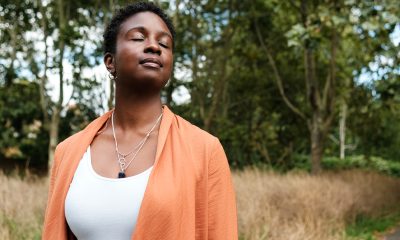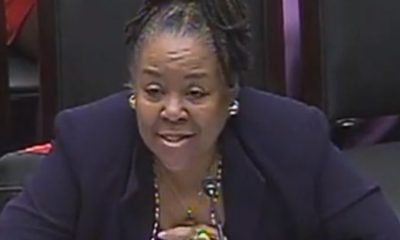Activism
Zoleka Mandela, Granddaughter of Nelson Mandela, Dies at 43
Zoleka Mandela, granddaughter of the South African martyr and its first democratically elected president, died on Sept. 25 after an 11-year battle with cancer. She was 43.

Special to The Post
Zoleka Mandela, granddaughter of the South African martyr and its first democratically elected president, died on Sept. 25 after an 11-year battle with cancer. She was 43.
Mandela spent her last years raising awareness about cancer prevention, providing details about her treatment for the disease that had begun with a diagnosis of breast cancer when she was 32.
She was treated and she was in remission until the cancer came back, spreading to her liver, spine, lungs, and brain.
The Nelson Mandela Foundation issued a statement Tuesday, news reports say, saying it “extends its heartfelt condolences to the Mandela family on the passing of Zoleka Mandela, tragically last night.”
“We mourn the loss of a beloved grandchild of Mum Winnie and Madiba and a friend of the Foundation.”
The foundation described her as “a tireless activist for Healthcare and justice.”
“Her work in raising awareness about cancer prevention and her unwavering commitment to breaking down the stigma surrounding the disease will continue to inspire us all,” it said.
Treated as an outpatient until being admitted to the hospital last week, Mandela had gained a following on social media for her candidness about the progress in her disease as well as some of the issues of her past, including depression, drug and alcohol addiction and being molested as a girl.
In addition to crusading for cancer awareness and fighting the stigma of the disease, Mandela had campaigned for road safety when her daughter was killed in a car accident in 2010.
“What do I tell my children?” Mandela posted on Instagram in August 2022. “How do I tell them that this time around I may not get to live my life as a survivor? How do I tell them everything will be OK when it’s not? I’m dying … I don’t want to die.”
In April, Mandela told a radio host on Kaya FM “I’m learning to be okay with my eventuality.”
Zoleka was 10 years old when Nelson Mandela was released from Robben Island in 1990 where he had been imprisoned in South Africa for 27 years. President Mandela died in 2013.
Zoleka Mandela was named one of the BBC’s 100 Women of the Year in 2016.
She was preceded in death by her daughter Zenani, and her son Zenawe who was born prematurely. She is survived by four other children.
BET, BBC and News 24 were sources for this report.
Activism
Oakland Post: Week of April 24 – 30, 2024
The printed Weekly Edition of the Oakland Post: Week of April 24 – 30, 2024

To enlarge your view of this issue, use the slider, magnifying glass icon or full page icon in the lower right corner of the browser window. ![]()
Activism
Oakland Post: Week of April 17 – 23, 2024
The printed Weekly Edition of the Oakland Post: Week of April 17 – 23, 2024

To enlarge your view of this issue, use the slider, magnifying glass icon or full page icon in the lower right corner of the browser window. ![]()
Activism
Oakland Schools Honor Fred Korematsu Day of Civil Liberties
Every Jan. 30, OUSD commemorates the legacy of Fred Korematsu, an Oakland native, a Castlemont High School graduate, and a national symbol of resistance, resilience, and justice. His defiant stand against racial injustice and his unwavering commitment to civil rights continue to inspire the local community and the nation. Tuesday was “Fred Korematsu Day of Civil Liberties and the Constitution” in the state of California and a growing number of states across the country.

By Post Staff
Every Jan. 30, OUSD commemorates the legacy of Fred Korematsu, an Oakland native, a Castlemont High School graduate, and a national symbol of resistance, resilience, and justice.
His defiant stand against racial injustice and his unwavering commitment to civil rights continue to inspire the local community and the nation. Tuesday was “Fred Korematsu Day of Civil Liberties and the Constitution” in the state of California and a growing number of states across the country.
One OUSD school is named in his honor: Fred T. Korematsu Discovery Academy (KDA) elementary in East Oakland.
Several years ago, founding KDA Principal Charles Wilson, in a video interview with anti-hate organization “Not In Our Town,” said, “We chose the name Fred Korematsu because we really felt like the attributes that he showed in his work are things that the children need to learn … that common people can stand up and make differences in a large number of people’s lives.”
Fred Korematsu was born in Oakland on Jan. 30, 1919. His parents ran a floral nursery business, and his upbringing in Oakland shaped his worldview. His belief in the importance of standing up for your rights and the rights of others, regardless of race or background, was the foundation for his activism against racial prejudice and for the rights of Japanese Americans during World War II.
At the start of the war, Korematsu was turned away from enlisting in the National Guard and the Coast Guard because of his race. He trained as a welder, working at the docks in Oakland, but was fired after the bombing of Pearl Harbor in 1941. Fear and prejudice led to federal Executive Order 9066, which forced more than 120,000 Japanese Americans out of their homes and neighborhoods and into remote internment camps.
The 23-year-old Korematsu resisted the order. He underwent cosmetic surgery and assumed a false identity, choosing freedom over unjust imprisonment. His later arrest and conviction sparked a legal battle that would challenge the foundation of civil liberties in America.
Korematsu’s fight culminated in the Supreme Court’s initial ruling against him in 1944. He spent years in a Utah internment camp with his family, followed by time living in Salt Lake City where he was dogged by racism.
In 1976, President Gerald Ford overturned Executive Order 9066. Seven years later, the 9th Circuit Court of Appeals in San Francisco vacated Korematsu’s conviction. He said in court, “I would like to see the government admit that they were wrong and do something about it so this will never happen again to any American citizen of any race, creed, or color.”
Korematsu’s dedication and determination established him as a national icon of civil rights and social justice. He advocated for justice with Rosa Parks. In 1998, President Bill Clinton gave him the Presidential Medal of Freedom saying, “In the long history of our country’s constant search for justice, some names of ordinary citizens stand for millions of souls … To that distinguished list, today we add the name of Fred Korematsu.”
After Sept. 11, 2001, Korematsu spoke out against hatred and discrimination, saying what happened to Japanese Americans should not happen to people of Middle Eastern descent.
Korematsu’s roots in Oakland and his education in OUSD are a source of great pride for the city, according to the school district. His most famous quote, which is on the Korematsu elementary school mural, is as relevant now as ever, “If you have the feeling that something is wrong, don’t be afraid to speak up.”
-

 Activism4 weeks ago
Activism4 weeks agoOakland Post: Week of March 27 – April 2, 2024
-

 #NNPA BlackPress4 weeks ago
#NNPA BlackPress4 weeks agoBeloved Actor and Activist Louis Cameron Gossett Jr. Dies at 87
-

 Community1 week ago
Community1 week agoFinancial Assistance Bill for Descendants of Enslaved Persons to Help Them Purchase, Own, or Maintain a Home
-

 Activism3 weeks ago
Activism3 weeks agoOakland Post: Week of April 3 – 6, 2024
-

 Business2 weeks ago
Business2 weeks agoV.P. Kamala Harris: Americans With Criminal Records Will Soon Be Eligible for SBA Loans
-

 Activism2 weeks ago
Activism2 weeks agoOakland Post: Week of April 10 – 16, 2024
-

 Community2 weeks ago
Community2 weeks agoAG Bonta Says Oakland School Leaders Should Comply with State Laws to Avoid ‘Disparate Harm’ When Closing or Merging Schools
-

 Community1 week ago
Community1 week agoOakland WNBA Player to be Inducted Into Hall of Fame





















































